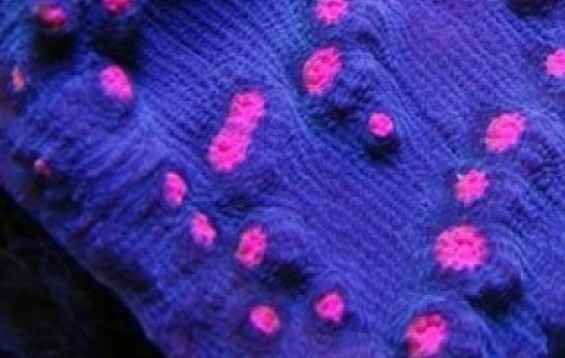- Name:
Raspberry Eye Mycedium Robokaki
- Family: Pectiniidae
- Species: Mycedium
- Scientific Name: Mycedium robokaki


General info about Raspberry Eye Mycedium Robokaki
n general, corals coming from the genus Mycedium takes the flat, laminar plane or plate type of coral growth. Their colonies have several plates that may originate from different points or planes. One distinct characteristics for a Mycedium coral is that their corallites are raised, tubular and has angular outward growth that forms a shape resembling like a nose.
As for the Raspberry Eye Mycedium Robokaki, they are predominantly colored dark blue with pink mouth. This are the water parameters for cultivating Raspberry Eye Mycedium Robokaki:
- Calcium: 380 - 430 ppm
- Alkalinity: 3.2 - 4.8 MEQ/L
- Phosphates: 0
- Magnesium: 1200 - 1350
- Strontium: 8 - 10
- Temperature: 74° - 82° F (23° - 27° C)
- Salinity / Specific Gravity: 1.023 - 1.025
Raspberry Eye Mycedium Robokaki Diet & Nutrition
The Raspberry Eye Mycedium Robokaki gets much of its nutrition from the symbiotic zooxanthellae living within their tissues. However, we still recommend you do supplemental feeding by adding mysis and brine shrimp.
Fragging / Propagating Raspberry Eye Mycedium Robokaki
A mature tank is recommended in cultivating Raspberry Eye Mycedium Robokaki. They are highly adaptive that it can grow and encrust any surface, including the glass component of your tank.
Flow / Lighting Requirements for Raspberry Eye Mycedium Robokaki
The Raspberry Eye Mycedium Robokaki requires moderate lighting and low to moderate waterflow. If they are exposed to strong waterflow, their tentacles wiill not go out, which in turn, will deprive them from feeding.
Parasites & Diseases that Affect Raspberry Eye Mycedium Robokaki
The Raspberry Eye Mycedium Robokaki are prone to brown jelly infection, especially if water conditions are not met and maintained.
Raspberry Eye Mycedium Robokaki Origin
The Raspberry Eye Mycedium Robokaki can be found in the waters of the Indo-Pacific Ocean.
Caution Should be Taken with Raspberry Eye Mycedium Robokaki
The Raspberry Eye Mycedium Robokaki has an aggressive behavior. Therefore, proper spacing must be maintained with regards to nearby corals.
How to Acclimate Raspberry Eye Mycedium Robokaki
The Raspberry Eye Mycedium Robokaki are purely marine, therefore, salinity must be maintained thoroughly at 1.023 to 1.025 specific gravity.
Stinging Tentacles on Raspberry Eye Mycedium Robokaki
The tentacles of the Raspberry Eye Mycedium Robokaki are classfied as sweeper tentacles where it can extend, invade and sting nearby corals.
Original Detail
| Name | Species | Family | Scientific Name | More Detail | Added by |
|---|---|---|---|---|---|
| Raspberry Eye Mycedium Robokaki | Mycedium | Pectiniidae | Mycedium robokaki | n general, corals coming from the genus Mycedium takes the flat, laminar plane or plate type of coral growth. Their colonies have several plates that may originate from different points or planes. One distinct characteristics for a Mycedium coral is that their corallites are raised, tubular and has angular outward growth that forms a shape resembling like a nose.
As for the Raspberry Eye Mycedium Robokaki, they are predominantly colored dark blue with pink mouth. This are the water parameters for cultivating Raspberry Eye Mycedium Robokaki:
|
PalaciosAn |
Changed by users
| Submitted Date | Submitted By | Status | Action |
|---|---|---|---|
| 2019-01-07 13:45:31 | Tristan Paylado | Approved |


